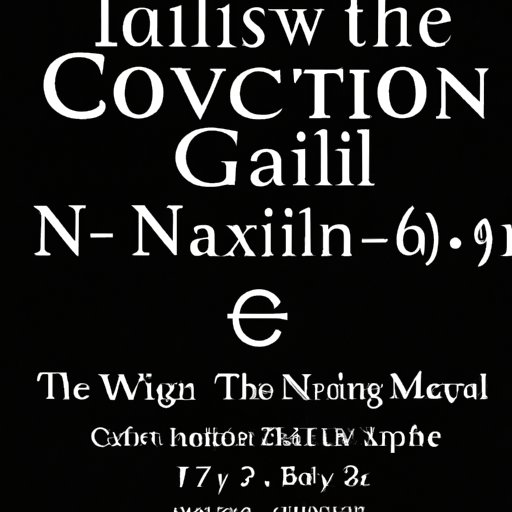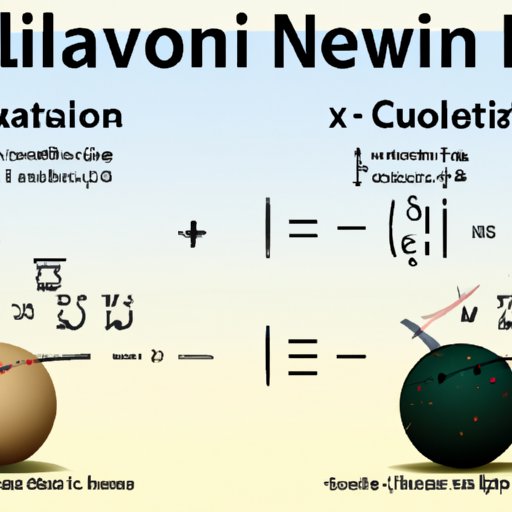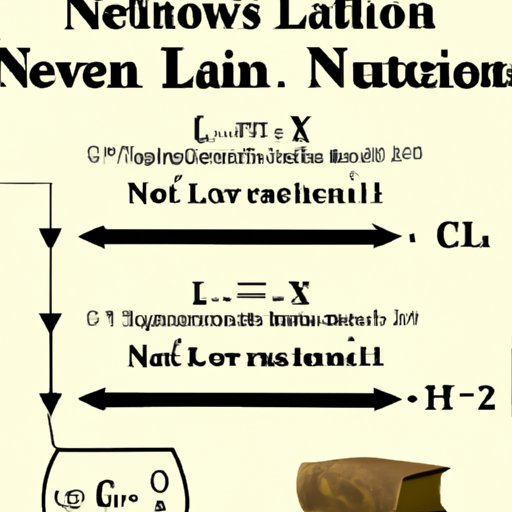Introduction
Calculus is a branch of mathematics that deals with the study of change and motion. It is used in many fields such as physics, engineering, economics, and more. The invention of calculus is credited to two mathematicians: Isaac Newton and Gottfried Leibniz. Both men made significant contributions to the development of calculus, but there has been much debate over who should be given credit for its invention.
A Biographical History of Calculus: Exploring the Lives of the Two Mathematicians Who Invented It
Isaac Newton was born on December 25th, 1642 in Woolsthorpe, England. He is widely considered one of the most influential scientists of all time. He studied mathematics and natural philosophy at Trinity College in Cambridge, England. During his time at Trinity, he developed the three laws of motion and the law of gravity, which laid the foundation for classical mechanics. He also developed calculus, which he referred to as “the science of fluxions”.
Gottfried Leibniz was born on July 1st, 1646 in Leipzig, Germany. He was a philosopher, mathematician, and physicist. He studied law at the University of Leipzig, but he was also interested in mathematics and philosophy. He developed a system of calculus independently of Newton, which he called “infinitesimal calculus”. He is also credited with developing the binary number system, which is the basis of modern computer technology.

The Story Behind Calculus: From the Minds of Isaac Newton and Gottfried Leibniz
Though both men are credited with inventing calculus, they had different approaches to the development of the discipline. Newton developed a form of calculus based on the idea of limits. His approach involved using infinite series and geometric methods to solve problems. He was also the first to use derivatives and integrals in his calculations.
Leibniz approached calculus differently. He focused on the concept of infinitesimals, which are infinitely small numbers. He used this concept to develop a system of equations and formulas for solving problems. He also developed the notation system for calculus that is still used today.

How Newton and Leibniz Revolutionized Mathematics with the Invention of Calculus
The invention of calculus by Newton and Leibniz revolutionized mathematics and had a profound impact on many fields. It allowed mathematicians to solve problems that had previously been unsolvable. It also provided a way to calculate rates of change, which enabled scientists to make predictions about the behavior of physical systems.
Calculus also opened up new possibilities in physics. It allowed for the calculation of forces and accelerations, which led to the development of classical mechanics. This in turn allowed for the prediction of the motion of objects and the behavior of complex systems.
A Look at the Contributions of Two Great Mathematicians: The Creation of Calculus
Both Newton and Leibniz made significant contributions to the development of calculus. Newton was the first to use derivatives and integrals in his calculations, and he developed a system of calculus based on the idea of limits. He was also the first to use infinite series and geometric methods to solve problems.
Leibniz developed a system of calculus based on the concept of infinitesimals. He also developed the notation system for calculus that is still used today. He was the first to apply calculus to physical problems, such as calculating the area under a curve.

The Development of Calculus: Examining the Ideas of Newton and Leibniz
The development of calculus by Newton and Leibniz was a revolutionary step forward in mathematics. Newton’s approach was based on the idea of limits and he developed a system of calculus using infinite series and geometric methods. Leibniz’s approach was based on the concept of infinitesimals and he developed a system of calculus using equations and formulas.
Both men made significant contributions to the development of calculus and their ideas were essential in its development. They both worked independently of each other, yet their work was complementary and had a profound impact on mathematics and physics.
Conclusion
The invention of calculus by Isaac Newton and Gottfried Leibniz revolutionized mathematics and had a profound impact on many fields. Newton developed a system of calculus based on the idea of limits, while Leibniz developed a system of calculus based on the concept of infinitesimals. Both men made significant contributions to the development of calculus and their ideas were essential in its development.
Calculus has become an integral part of mathematics and physics, and it has allowed for the prediction of the behavior of physical systems. The contributions of Newton and Leibniz to the development of calculus have been immense, and their work will continue to shape mathematics and physics for generations to come.
(Note: Is this article not meeting your expectations? Do you have knowledge or insights to share? Unlock new opportunities and expand your reach by joining our authors team. Click Registration to join us and share your expertise with our readers.)
